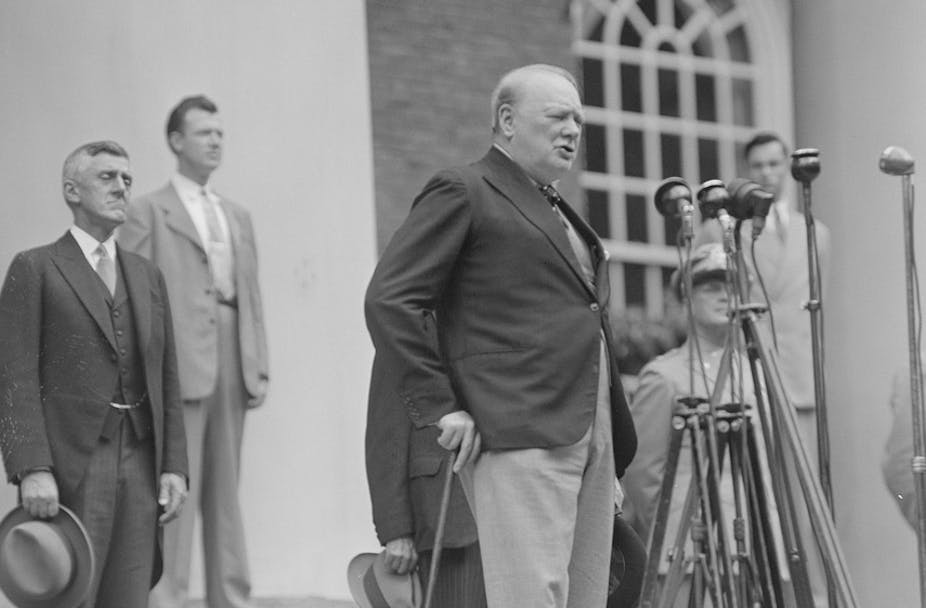Atrocities in English are committed every day. Here are three of the worst. You may be surprised, but hopefully you won’t literally explode with anger.
When we talk of words, even if we don’t know it, we tend to divide ourselves into two schools of thought - the descriptivists and the prescriptivists. Prescriptivists tend to believe that English has hard and fast rules, and that language change, particularly when vulgar, should not be included in dictionaries. Thus, they will get very upset at split infinitives and (unlike Churchill) ending a sentence with a preposition.
When an editor rewrote Churchill’s words to avoid ending a sentence with a preposition, he is said to have angrily responded, “This is the sort of English up with which I will not put.”
Descriptivists, by contrast, tend to be more tolerant of language change and may feel uncomfortable laying down the law on what Correct English is.
‘I, like, literally died’
So what do you think you are? Even though you may be uncomfortable being classified as someone who lays down rules, consider how you would feel if you heard a friend say, “I literally exploded with anger!” Most of us would say that this is absurd, that your friend had confused literally with figuratively or virtually.
And yet, as Salon Magazine points out, a number of dictionaries (Merriam-Webster and Macmillan Dictionary) have taken the extreme descriptivist path of allowing literally to mean figuratively.
The online [Dictionary.com](http://dictionary.reference.com/browse/literally?s=t](http://dictionary.reference.com/browse/literally?s=t) sits slightly on the fence, seeing the new meaning as an [intensifier,](http://dictionary.reference.com/browse/intensifier?s=t](http://dictionary.reference.com/browse/intensifier?s=t) a word that puts emphasis on what they are saying. In this way, literally can mean “actually; without exaggeration or inaccuracy”.
If you think this admission of a new meaning of literally is ridiculous, then you are on the way to being a prescriptivist.
Hopefully, I will have hope
Consider the fate of the adverb hopefully, as in the Robert Louis Stevenson quote “To travel hopefully is a better thing than to arrive,” where the verb or doing word – travel – is modified by an adverb, hopefully, telling us how we will feel about travelling. In the past 30 years or so, a new meaning has emerged, making the word hopefully a [disjunct](http://en.wikipedia.org/wiki/Disjunct_(linguistics), or sentence adverb, as in “hopefully, it will be OK”.
I hear this usage as code for “I don’t have much hope at all – go away and don’t bother me.” Many dictionaries and [usage books](http://books.google.com.au/books?id=BEHFyMCdwssC&pg=PA105&lpg=PA105&dq=american+heritage+hopefully&source=bl&ots=yqqIcAzzWp&sig=LYTNiP1hpyurvqAxf0_dhOIrQfI&hl=en&sa=X&ei=ki1vU5yyG8zylAXz_oHIAw&ved=0CEwQ6AEwAw#v=onepage&q=american%20heritage%20hopefully&f=false](http://books.google.com.au/books?id=BEHFyMCdwssC&pg=PA105&lpg=PA105&dq=american+heritage+hopefully&source=bl&ots=yqqIcAzzWp&sig=LYTNiP1hpyurvqAxf0_dhOIrQfI&hl=en&sa=X&ei=ki1vU5yyG8zylAXz_oHIAw&ved=0CEwQ6AEwAw#v=onepage&q=american%20heritage%20hopefully&f=false) try to say it’s no worse than regrettably or arguably, but they’re wrong; it is: as Kingsley Amis observed, the person who uses it as a sentence adverb/disjunct:
…can’t say ‘I hope’ because that would imply that he has surrendered control of events; he can’t really use J. F. Kennedy’s favourite, ‘I am hopeful that’, without being J. F. Kennedy; he can’t say ‘with luck’, which is all he means; so he says ‘hopefully’ and basks in a fraudulent glow of confidence.
It is also different from other disjuncts in that it can cause ambiguity in syntax, or sentence construction. Ernest Gowers and Bruce Fraser in Plain Words give this example: “our team will start their innings hopefully immediately after tea”.
This is what is called a squinting modifier: are they starting hopefully, or are we speculating that it may occur at a certain time?
We can see the true workings of hopefully as a weasel word.
In other words, if an airline clerk says, “Hopefully, your luggage will turn up,” you should be very afraid. How about may, with luck, or even I hope? Or even better: “Our standard procedures for locating baggage are state of the art: I think we will get them back for you quite soon.”
Whoa, Nelly! Confidence AND competence. There may even be a case for saying the more incompetent an organisation or person is, the more you will hear disjuncts all over the place (well, hopefully not).
When we track the use of the open “I hope” with “hopefully” over a long period, using techniques called corpus linguistics, we see an interesting trend:

This is the Google Ngram Viewer, drawing upon particular bodies of text over a long time (this body of text is 5.2 million books, with this slice in 2009 American English). You can do the same thing just by going to Google Ngram on the net. While this is not as precise as some statistical techniques, the diagram is suggestive.
Obviously the old adverb-only meaning of hopefully is there in the lower line, as well as the new sneaky disjunct/sentence adverb one, but the two trends together are suggestive. Perhaps people have become less certain about giving a straightforward “I hope” from 1838 onwards.
All this begs the question…
Don’t get me started on begs the question: this is a logical error (“I like rock and roll because it’s the best kind of music around”) and not a synonym for prompts/suggests/gives rise to the question.
Perhaps people who say this imagine a dog begging for a biscuit. If they get away with it by bamboozling their listeners, perhaps it’s more accurate to say that they got away with begging, borrowing or stealing the question.

These three monstrosities – the distortion of the true meanings of beg the question, hopefully and literally – need to be terminated with extreme prejudice. Prescriptivist? Grammar fascist? You bet!

